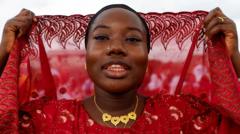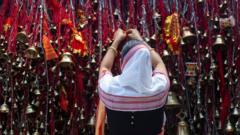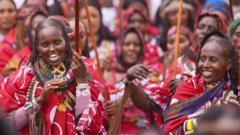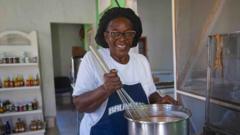The inclusion of attiéké in UNESCO’s intangible cultural heritage list underscores its role in community life and women's empowerment in Ivory Coast.
**Attiéké: Ivory Coast's Cultural Cornerstone Recognized by UNESCO**

**Attiéké: Ivory Coast's Cultural Cornerstone Recognized by UNESCO**
Ivory Coast’s cherished dish attiéké receives UNESCO recognition for its cultural significance.
Attiéké, a cherished dish made from fermented cassava flour, has been officially recognized by UNESCO as an intangible cultural heritage of humanity. Pronounced as "atchekay," this staple food is often enjoyed with grilled fish and is considered a culinary cornerstone by the people of Ivory Coast. It has gained immense popularity throughout West Africa but remains most significant in its place of origin, where it has been part of daily life for centuries.
During a recent session in Paraguay on safeguarding intangible cultural heritage, Ivory Coast’s delegate Ramata Ly-Bakayoko emphasized that attiéké is intricately woven into the fabric of community life, often partaken at various gatherings, including weddings, baptisms, funerals, and communal meetings. The recognition by UNESCO reinforces not only the dish’s importance as a meal but also its role as a source of income and empowerment, especially for women who traditionally prepare it.
The preparation of attiéké is labor-intensive, typically involving multiple steps that are passed down through generations. Women peel, grate, and ferment the cassava, which then undergoes a meticulous process of pressing, drying, and steaming, before being sold in local markets. This artisanal practice not only preserves cultural traditions but also fosters economic independence for many.
Additionally, this recent recognition comes amidst a backdrop of controversy regarding the cultural ownership of attiéké. A notable incident in 2019 sparked outrage when a foreigner won acclaim for preparing a dish that many Ivorians believe represents their national identity. There have been efforts, such as registering a collective trademark, to protect the authenticity of attiéké from being mislabeled or sold under foreign production.
UNESCO's listing highlights the necessity to safeguard traditional practices and recognizes the collective importance of culinary heritage to humanity. As attiéké's official status is celebrated, it serves as a reminder of the profound connection between food, culture, and identity among the people of Ivory Coast.
During a recent session in Paraguay on safeguarding intangible cultural heritage, Ivory Coast’s delegate Ramata Ly-Bakayoko emphasized that attiéké is intricately woven into the fabric of community life, often partaken at various gatherings, including weddings, baptisms, funerals, and communal meetings. The recognition by UNESCO reinforces not only the dish’s importance as a meal but also its role as a source of income and empowerment, especially for women who traditionally prepare it.
The preparation of attiéké is labor-intensive, typically involving multiple steps that are passed down through generations. Women peel, grate, and ferment the cassava, which then undergoes a meticulous process of pressing, drying, and steaming, before being sold in local markets. This artisanal practice not only preserves cultural traditions but also fosters economic independence for many.
Additionally, this recent recognition comes amidst a backdrop of controversy regarding the cultural ownership of attiéké. A notable incident in 2019 sparked outrage when a foreigner won acclaim for preparing a dish that many Ivorians believe represents their national identity. There have been efforts, such as registering a collective trademark, to protect the authenticity of attiéké from being mislabeled or sold under foreign production.
UNESCO's listing highlights the necessity to safeguard traditional practices and recognizes the collective importance of culinary heritage to humanity. As attiéké's official status is celebrated, it serves as a reminder of the profound connection between food, culture, and identity among the people of Ivory Coast.


















